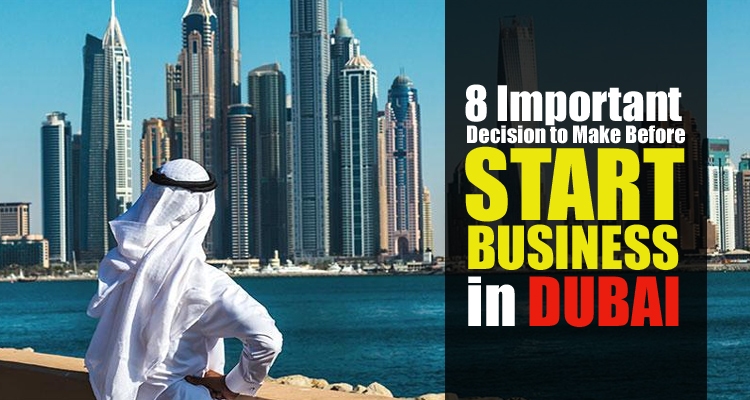8 Important Decisions to Make Before You Start A Business In Dubai
Are you a visionary entrepreneur looking to start a business in Dubai? Do you have a great idea that can provide benefits to customers? Is your company aiming at providing an internationally sought-after service?
Starting a business in Dubai is easier than you may think with the Dubai Free Zone company setup. The registration laws are well structured and simple. There are various types of businesses you can run in Dubai:
- for-profit
- General trade and Service
- Contractors
- Share Companies
- SMEs
All these types of businesses fall under the Free Zone (International Free Zone Authority) jurisdiction, making things further easier and making it very easy to understand the procedure to start a business in Dubai.
Also Read: A Step by Step Complete Guide to Start a Business in Dubai
Basic Requirements to Start a Business in Dubai
If you want to know how to start a business in Dubai or want to learn the basic requirements to start a business in Dubai. Here are eight decisions that need to be made to start the business in Dubai.
1. Type of Business
There are some great reasons to consider setting up a business in Dubai, whether you’re coming from the UK or Europe and looking for financial reasons to start a business or simply because of the quality of life. Whatever your reason may be to join the growing numbers of British and European ex-pats living in Dubai or the sector you’re planning on entering, there are several things you should know before starting your new business.
Next step: Register your business in Dubai. There are many types of business licenses you can obtain in Dubai; however, three main categories are commonly chosen: Commercial, Professional, and Industrial.
While selecting your license, keep in mind that certain activities, such as jewellery trading, veterinary activities, and legal consulting will require additional approvals from other government departments.
When setting up your business at IFZA, you can choose from thousands of business activities listed under the above license types. IFZA also offers the flexibility to combine business activities. IFZA’s simple and straightforward company formation process enables you to start operating within days.
2. Ownership
You can own 100% of your company in IFZA, with no requirement to have a local partner or sponsor. You can also hold your profits and transfer them abroad without any restrictions or tax implications.
3. Legal Structure
IFZA licenses are FZCO, which are limited liability companies governed under the rules and regulations of the Free Zone in which it is established. Any individual can have 100% ownership of a company in IFZA, regardless of nationality or residency status. What’s more, IFZA has waived the minimum paid-up share capital requirement to apply for FZCO license. This company can conduct trading and commercial activities within the Free Zone, across other Free Zones and anywhere else in the world without restriction on movement of capital or profits. However, an FZCO cannot conduct business directly with the local market (also known as the Mainland) unless an agent or a distributor is appointed.
4. Trade Name
When you decide to start your own business, the first thing that comes to your mind is the name. There have been various criteria to choose a trading name for a business. Most companies follow the one that the name should be easily recognized and should have no limitations like the availability of domain names or trademarks in any country. There are specific rules that must be observed in choosing a registered business name and most business owners find it a challenge to think of unique and catchy names.
5. Share Capital
Share capital is one of the pivotal aspects you need to focus on when starting a new business in Dubai. The Memorandum of Association (MoA) usually sets out the minimum share capital. In most cases, the minimum paid-up share capital is not required when you set up your company since it can be accumulated over time.
6. Premises
The premise can be a warehouse, an office, or something else. The commercial license type determines the type of premises you’re allowed to operate from.
To find a premise for your company, contact the Free Zone authority where you’re interested in establishing your company. They will provide information about available spaces and how much they cost.
The second step is to submit your application form to the Free Zone authority along with the required documents and fees.
7. Staffing
Staffing your company is made easier due to the availability of professional and skilled talent in the UAE. You can either hire locals or expatriates, but you will need to abide by the various regulations governing employment in the UAE, including the securing of the necessary UAE Residence Visas or work permits that are allocated in your IFZA License. You can also choose to outsource your staffing requirements.
8. Local Support
Many of the Dubai company owners understand it is helpful to have local support. This is not a rule, but it is a recommended practice. As with any business, the more local support you have and networking you do — the greater your likelihood of success.
Also Read: 16 Profitable and Popular Ideas for Starting a Business in Dubai
Conclusion
No matter your business idea or field of business, Dubai has the ideal infrastructure, laws, and regulations that make it a great place to start your company. Remember that all this can be taking place without you having to lift a finger.




